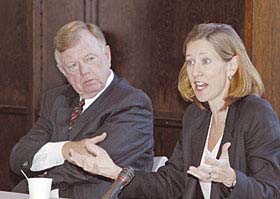For more archives, go to the Advance Archive/Search Page.
Politics Take Back Seat To Other News,
Society To Blame, Say Panelists
Journalists, says Timothy Kenny, an associate professor of journalism at UConn, don't lead the country; they merely reflect what society tells them it wants. So when reporters spend an inordinate amount of time writing about the Laci Petersen murder or entertainers, rather than digging deeply into the issues facing America during a presidential election year, it's the public's own fault.
 |
|
Political reporter Tom Monahan and Duby MacDowell, a former
TV reporter, take part in a panel discussing how the media
cover elections that took place at the North Reading Room in
the Wilbur Cross Building. |
"If we as a society decide to change these rules, so be it. But, until then, we're getting what we ask for," Kenny told an audience of about 100 people during the first event of two days of panels, debates, and discussions surrounding the 2004 presidential election. "I can't speak for why the country is like this, why we pay more attention to a kid with one hit record than we do to Nobel Prize winners, but that's where we are."
Kenny joined three other panelists - Tom Monahan, long-time political reporter for NBC-30 in Connecticut; Duby McDowell, former political reporter for NBC-30 and WFSB-TV3; and Mickey Carroll, director of the Quinnipiac University Polling Institute. Each offered different opinions about media coverage of the Kerry-Bush race, but all seemed to agree that the coverage has been lackluster.
"There's a lot of lousy reporting," said Carroll, who wrote for The New York Times, The Star Ledger (Newark), and other papers for 30 years before turning to polling. "There's a lot of irrelevant reporting. Most of the cable news is junk. In fact, most of the local reporting is lousy."
Carroll said he thinks there are too many "young, inexperienced reporters" covering local and national politics.
Monahan, a reporter for NBC-30 for more than 30 years, including many years as the channel's political reporter, agreed.
"It's so much easier to cover a murder, a car crash, than to take a serious look at the job market, the state budget, layoffs," he said. "Television is not interested in spending the money you need to hire and keep veteran reporters. You can cover that stuff with a new, young reporter you bring in from anywhere in the country."
With Connecticut considered a safe state for Kerry in the presidential elections, Monahan said, neither candidate has bothered - nor is likely to bother - to visit Connecticut, except to "occasionally come get some money out of Fairfield County." That leaves local media to cover Congressional and state elections, which also tends to water down local coverage, he said.
And it makes life hard for people like McDowell, the former political reporter and talk show host who now finds herself on the other side of the camera, running a political communications company, Global Strategies, that has to place its candidates' faces in the news.
"I recall how casual I used to be when I got calls from press people . 'Oh, sure, I'll get back to you,' I'd say. Maybe I did, maybe not, but it wasn't a high priority. Now I'm on the other side, and I realize these guys [people working in the media] are enormous figures, and I have to get my guy on the network, in the newspapers," McDowell said.
"I realize now how all-important the press secretary's job is. It can help a campaign live or die. Getting positive coverage is all-important," she added.
McDowell also said it's vital for candidates to have a clear message - something she doesn't think John Kerry has done.
"In the Sunday New York Times a few weeks ago, there were a series of opinions on the editorial page, all answering the question 'Here's what John Kerry should do.' That's really not a good sign for the Kerry camp," she said. "If a candidate has a clear message, the media is going to report it. If they hear it again and again, they're going to write it."
As the election approaches, getting positive coverage becomes all the more important, said Carroll, the Quinnipiac pollster.
"All the polls show the race is narrowing," he said. "We just conducted a poll in New Jersey, and it was 48 percent for Bush and 48 percent for Kerry. A month ago, if somebody asked me about New Jersey, I would have said color it blue and throw away the crayons. Now I think you have to keep the crayons in your pocket.
"Right now, the race is not Bush vs. Kerry, it's Bush vs. Bush," Carroll said. "Should he continue as president or should he be thrown out. Sixty-one percent of the people in New Jersey who said they would vote for Kerry said they supported him because they wanted to get rid of Bush. It's a referendum on Bush."
There are also other factors at play, UConn's Kenny pointed out. "The tallest guy usually wins," he said.

